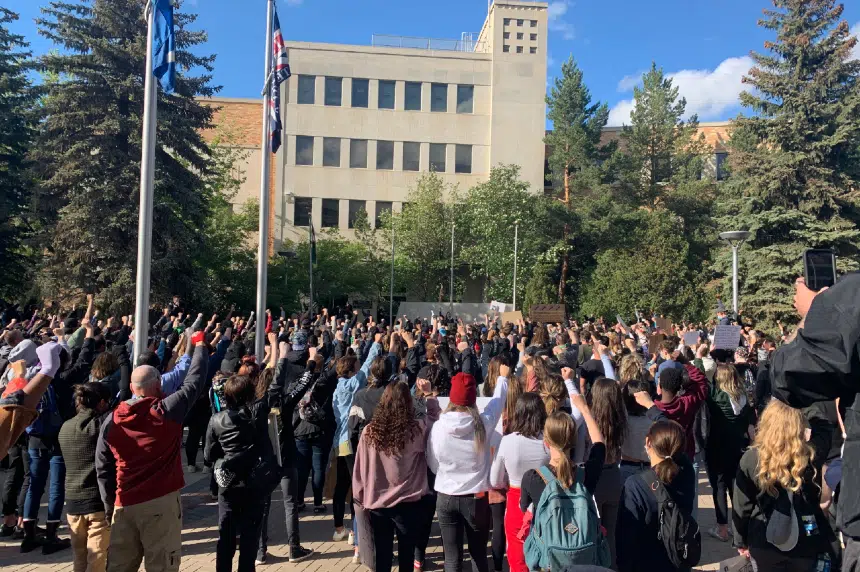By her own admission, Eileen Bear’s personal experiences with police haven’t been very pleasant. As a spokesperson for the group “Saskatoon Coordinating Committee Against Police Violence,” she’s one of dozens of people who are calling for the defunding of Saskatoon Police.
More than 40 people have sent letters, many from a template provided by the group, calling for $43 million to be immediately cut from the police budget, in line with the City of Saskatoon’s projected COVID-19 related deficit. Several other demands have also been made. The letters are being presented at Thursday’s Board of Police Commissioner’s Meeting.
During her experience, Bear described getting dressed in warm clothing, and taking a bag to go to a knitting class. She walked across Pleasant Hill Park towards St. Paul’s Hospital. She said two police officers in a vehicle drove up next to her, lowered their window and told her she resembled someone they had been trying to locate.
“I had a chuckle because I thought it was funny and I said, ‘No, I don’t think so,’ and I proceeded to cross the street onto the sidewalk in front of St. Paul’s Hospital. He parked the car, got out and was following me. I stopped and I turned around and said, ‘Look, what do you want?’ ”
She says the officer asked for her name, and she countered with asking for the officer’s badge number. That exchange lasted a few minutes until the she said the officer asked to search her.
“I put both hands up and backed away and said, ‘No, you’re not touching me,’ and then the other male officer got out of the vehicle.”
She began to think what would happen if she was arrested, and what would happen to her 12-year-old boy. She says she felt intimidated.
“Fine, I said. My name is Eileen Bear. And then, they were asking for my date of birth, my home address and where I was going. One officer leaned in real close- enough for me to feel his breath on my cheek and my neck- and said, ‘There now, was that so hard?’ Oh my gosh, I felt so humiliated, I wanted to burst into tears.”
She says she was asked to go towards the police vehicle, but instead turned around and walked away.
“I didn’t want them to see me crying.”
She’s now a member of the vocal Saskatoon advocacy group behind last Sunday’s “Disarm, Defund and Abolish the Police” rally. She contends that far too much money is spent on police and what she says is unnecessary equipment.
“What resonates with me and other Indigenous people is that they don’t need tasers, they don’t need batons, they don’t need militarized vehicles, they don’t need the laptops. They don’t need the cameras- the body cameras that don’t do anybody any good.”
She is also advocating for jails to be abolished, and for restorative justice to take a prominent role in addressing both minor and violent crimes, adding that services like mental health, addictions and housing need to be better funded.
Bear says she and others from her group will take part in Thursday’s meeting.
Saskatoon’s Police Chief Troy Cooper addresses letters
During a conference call Wednesday, Saskatoon’s Police Chief Troy Cooper said sometimes what happens globally or even nationally gets applied to his department. He added that it was part of the department’s responsibility to communicate to the public what they’re doing to address racism and biases.
“Our strategic plan launched last month highlights the need for communication and so we’ve got steps planned to ensure that people are aware locally at least, what the Saskatoon Police are doing to address some of those issues. It is complicated.”
He said the SPS needed to listen right now. They’ll also attempt to engage groups like the Saskatoon Co-ordinating Committee Against Police Violence.
“We’re not going to knee jerk react to what we’re seeing in the community.We want to make sure that we give some really solid, serious thought about what we’re hearing and what does it mean to us, and what is it that the community is saying.”
He added that only then could they assess the direction of the SPS and what the community would like to see.
Many officers, he explained, have also been severely impacted by the deaths of George Floyd and others including Indigenous peoples who have died at the hands of police. It has been demoralizing for them at times.
“They are able to look at what’s occurring and understand their role in that discussion and their place in that discussion and hope for the best; hope that something positive comes out of these discussions and this call for reform so that they can have a job that’s even more supported by the community.”







